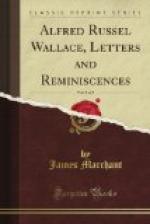What I have done in this way is not ready for publication, but I may mention (privately, please) that these persistent marks, which seem fully developed in the sixth month of foetal life, and appear under the reservations and in the evidence published in the memoir to be practically quite unchanged during life, are not correlated with any ordinary characteristic that I can discover. They are the same in the lowest idiots as in ordinary persons. (I took the impressions of some 80 of these, so idiotic that they mostly could not speak, or even stand, at the great Darenth Asylum, Dartford.) They are the same in clod-hoppers as in the upper classes, and yet they are as hereditary as other qualities, I think. Their tendency to symmetrical distribution on the two hands is marked, and symmetry is a form of kinship. My argument is that sexual selection can have had nothing to do with the patterns, neither can any other form of selection due to vigour, wits, and so forth, because they are not correlated with them. They just go their own gait, uninfluenced by anything that we can find or reasonably believe in, of a naturally selective influence, in the plain meaning of the phrase.—Very sincerely yours,
FRANCIS GALTON.
* * * * *
TO THEO. D.A. COCKERELL
Parkstone, Dorset. March 10, 1891.
Dear Mr. Cockerell,— ... Your theory to account for the influence of a first male on progeny by a second seems very probable—and in fact if, as I suppose, spermatozoa often enter ova without producing complete fertilisation, it must be so. That would be easily experimented on, with fowls, dogs, etc., but I do not remember the fact having been observed except with horses. It ought to be common, when females have young by successive males.—Yours faithfully,
A.R. WALLACE.
* * * * *
The next letter relates to a controversy with Romanes concerning Herbert Spencer’s argument about Co-adaptation which Romanes had urged in support of Neo-Lamarckism as opposed to Natural Selection. Prof. Meldola endeavoured to show that the difficulties raised by Spencer and supported by Romanes had no real weight because the possibility of so-called “co-adaptations” being developed successively in the order of evolution had not been reckoned with. There was no real divergence between Wallace and Prof. Meldola on this matter when they subsequently discussed it. The correspondence is in Nature, xliii. 557, and subsequently. See also “Darwin and After Darwin,” by Romanes, 1895, ii. 68.
TO PROF. MELDOLA
Parkstone, Dorset, April 25, 1891.
My dear Meldola,—You have now put your foot in it! Romanes agrees with you! Henceforth he will claim you as a disciple, converted by his arguments!




